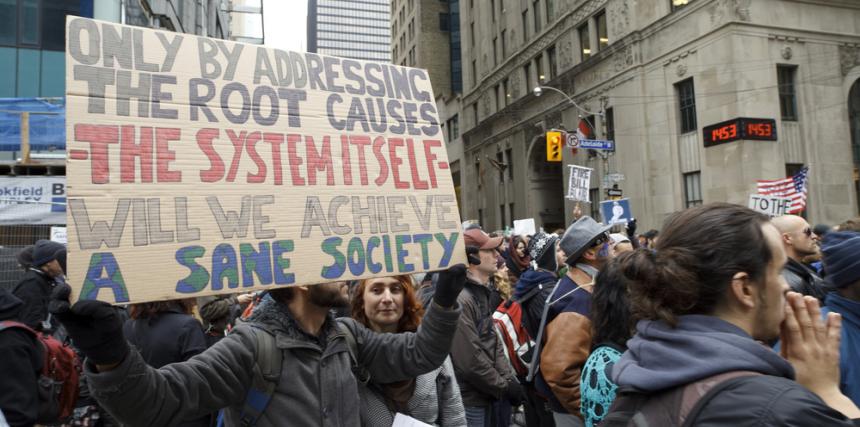This is the second in a series of blogs about the movement response to COVID-19.
In this moment of tens of thousands of lives lost, anti-Asian racism, and inequitable access to COVID-19 testing, many of the systemic social problems of the United States have been laid bare—specifically, the ways in which this country has always worked for the wealthy elite, while marginalized people suffer or are forced to put their health on the line to uphold and preserve the unequal status quo.
Dozens of celebrities were able to quickly get tested for COVID-19, while the majority of the country is either told to wait or simply unable to get the test due to rationing. Many of these same people who are denied access to testing are also those whose labor has been elevated to “essential,” an overdue appreciation that has tragically made them far less safe as they continue to work outside of their homes. And our essential healthcare workers, farmworkers, garment workers, domestic workers, sanitation workers, construction workers, and service workers, are more often than not undocumented, Black, Latinx, Native, Asian, queer, trans, poor, or living with disabilities. Indeed, only 16.2 percent of Latinx workers and 19.7 percent of Black workers can telework. Many underpaid workers in the essential industries do not have access to paid sick leave, so they must continue to work or potentially starve. In addition to the anxiety of catching the potentially deadly COVID-19, many poor people are also experiencing the stress of being laid off and unable to afford this month’s rent because they are forced to live paycheck to paycheck.
Our society as it is currently configured—to exploit, neglect, or dispose of those who are not wealthy, cisgender, heterosexual, non-disabled, or white—is simply not tenable or sustainable for communities that continue to be oppressed on a multitude of fronts. Throughout the United States, especially in the South and Midwest regions, opportunistic conservatives in this period of pandemic have levied unrelenting attacks on voting rights and reproductive freedom. These violations do not exist in a vacuum, they are rooted in historic disenfranchisement, mass criminalization, and the gutting of social welfare programs. While COVID-19 is particularly deadly for older people, an alarming number of young people are dying of COVID-19 in the Deep South as a result of ongoing structural harm through law and policy: in this part of the country where there are many rural Black and Latinx communities, limited access to quality healthcare is the norm.
The inconsistent messaging around COVID-19 and delayed public health responses from federal and state governments over the past two months are indicative of how impossible it is to manage this wide-reaching emergency without universal health care, universal basic income, adequate tenant protections, and the realization of the human right to water as well as freedom from environmental hazards. While the Centers for Disease Control and Prevention (CDC) guidelines call for washing one’s hands under clean running water, how can you wash your hands multiple times a day when your water is shut off or has never been connected? Over one-third of community members on the Navajo Nation reservation do not have access to clean water sources or sanitation. And when crumbling infrastructure is combined with exposure to toxic chemicals and air pollution, as is the case in many poor Black communities across the U.S., entire communities are immunocompromised with asthma and other respiratory conditions that make the risk of contracting COVID-19 lethal.
These medical vulnerabilities that heighten the risk of death from COVID-19 are perhaps most acutely apparent in our vast carceral system, as illuminated by our ICE detention litigation in Louisiana, Mississippi, and Alabama. There are over two million people behind bars in this country who, due to deplorable confinement conditions and the inability to social distance, are especially vulnerable to contracting COVID-19 and have limited access to hospital care. So as we work to build a future where our society is fundamentally prepared for a pandemic, we must begin with a commitment to dismantling the prison-industrial complex.
Instead, the political will as expressed in the large stimulus package passed by Congress in March demonstrates a profound disregard for the poor communities filled with vulnerable people who will bear the brunt of COVID-19. If the White House can quickly scramble together two trillion dollars in an emergency situation, why not reparations for Black Americans descended from the enslaved Africans who built this nation or the honoring of historical treaties made with Indigenous tribes? Why is it so hard to imagine an increase in the minimum wage for all workers? Universal healthcare and a basic income? The canceling of student debt? There is no shortage of wealth and resources to make these proposals possible; the United States is the wealthiest nation in the world. This country has more than enough resources to enact policies that prioritize the health and wellness of everyone. Those in power choose not to.
As horribly dismal as things may feel right now, this moment can serve as a strategic opening through which we can begin the process of abolishing these social structures that cause us harm. It is the duty of us who believe in social change to explore the radical possibilities of this moment. We must leverage our privileges during this time to demand much more from politicians, and amplify the demands of the people harmed by these systems.


